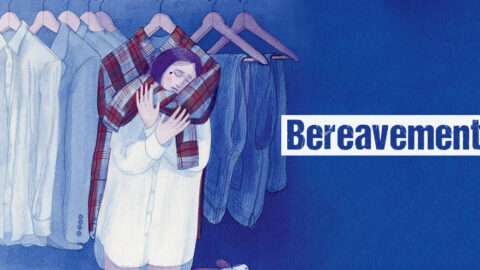Bereavement refers to an emotional state of mourning the loss of a loved one to death. It can be characterized by the intense grief we experience after the death of a close one when our emotions are at their extremity.
What Is Bereavement?
Bereavement is a period of grief and associated emotions that people experience as they gradually adjust to the loss of someone important to them. It encompasses several human emotions from tremendous sorrow to extreme anger. The process of adapting to a loss or how long the grief lasts can depend on how close one was to the person who died.
The term ‘bereavement’ is often interlinked with the feeling of grief, but it can also be experienced after other significant losses, such as the end of an important relationship, loss of a job, or decline in the physical or mental health of a loved one.
“Loss of a loved one usually leads to acute grief characterized by yearning and longing, decreased interest in ongoing activities, and frequent thoughts of the deceased,” a 2014 research 1 Shear, M. K., Ghesquiere, A., & Glickman, K. (2013). Bereavement and complicated grief. Current psychiatry reports, 15(11), 406. https://doi.org/10.1007/s11920-013-0406-z suggests. According to this study, the period of grief involves emotional, cognitive, functional, and behavioral responses to the death. It can be considered the behavioral manifestation of grief influenced by various social and cultural rituals, including funerals and visitations.
Understanding Bereavement
Losing an important person or witnessing the end of a significant relationship can be emotionally devastating for any individual. Though this specific emotion is associated with several psychological phenomena, it is considered a healthy and natural response to loss. The response can vary, but intense grief while dealing with a loss can take a toll on mental health. A recent 2021 study 2 Mughal S, Azhar Y, Siddiqui WJ. Grief Reaction. [Updated 2021 Jul 23]. In: StatPearls [Internet]. Treasure Island (FL): StatPearls Publishing; 2021 Jan-. Available from: https://www.ncbi.nlm.nih.gov/books/NBK507832/ estimated that 7-10% of bereaved individuals do not adapt to the loss and, in turn, develop complicated grief.
It is a natural human emotion that comes with a range of physical and mental symptoms and cannot be referred to as a psychological disorder individually. But the Diagnostic and Statistical Manual of Mental Disorders, 5th Edition (DSM-5) has termed it as ‘uncomplicated bereavement’ and mentioned that it requires clinical attention.
“In some bereaved individuals with pre-existing vulnerabilities, for example, the intense pain and distress fester, can go on interminably, and the loss may provoke psychiatric complications, such as major depression,” a 2009 research paper 3 Zisook, S., & Shear, K. (2009). Grief and bereavement: what psychiatrists need to know. World psychiatry : official journal of the World Psychiatric Association (WPA), 8(2), 67–74. https://doi.org/10.1002/j.2051-5545.2009.tb00217.x suggests. During the grieving process, most people experience some common emotions, such as:
- Feelings of sadness
- Mild to extreme anger
- Loneliness
- Helplessness or hopelessness
- Neglecting daily responsibilities
- Difficulty in accepting the loss
- No motivation to interact with people
Symptoms Of Bereavement
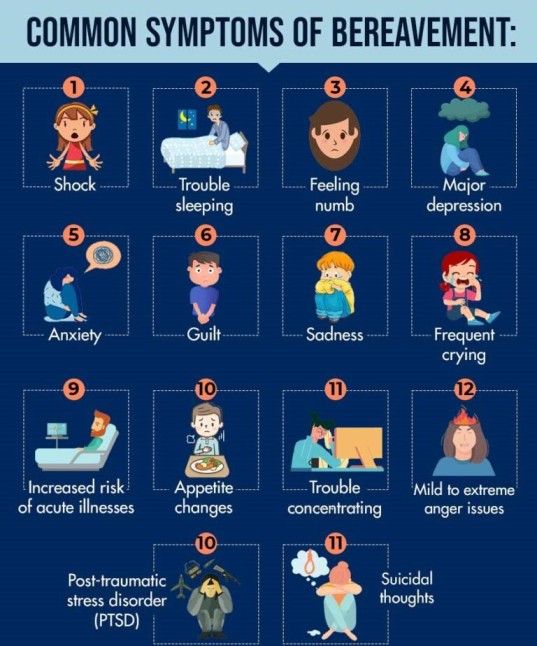
There is a common belief that bereavement involves only sadness, but it can be more intense both emotionally and physically, and a bereaved person can develop a broad range of symptoms during different stages of grief.
While experiencing grief, one may develop the following signs and symptoms:
- Shock 4 Institute of Medicine (US) Committee for the Study of Health Consequences of the Stress of Bereavement; Osterweis M, Solomon F, Green M, editors. Bereavement: Reactions, Consequences, and Care. Washington (DC): National Academies Press (US); 1984. CHAPTER 3, Adults’ Reactions to Bereavement. Available from: https://www.ncbi.nlm.nih.gov/books/NBK217845/
- Trouble sleeping 5 Monk, T. H., Germain, A., & Reynolds, C. F. (2008). Sleep Disturbance in Bereavement. Psychiatric annals, 38(10), 671–675. https://doi.org/10.3928/00485713-20081001-06
- Feeling numb 6 Shear M. K. (2012). Grief and mourning gone awry: pathway and course of complicated grief. Dialogues in clinical neuroscience, 14(2), 119–128. https://doi.org/10.31887/DCNS.2012.14.2/mshear
- Major depression 7 Lamb, K., Pies, R., & Zisook, S. (2010). The Bereavement Exclusion for the Diagnosis of Major Depression: To be, or not to be. Psychiatry (Edgmont Pa. : Township), 7(7), 19–25.
- Anxiety 8 Robinaugh, D. J., McNally, R. J., LeBlanc, N. J., Pentel, K. Z., Schwarz, N. R., Shah, R. M., Nadal-Vicens, M. F., Moore, C. W., Marques, L., Bui, E., & Simon, N. M. (2014). Anxiety sensitivity in bereaved adults with and without complicated grief. The Journal of nervous and mental disease, 202(8), 620–622. https://doi.org/10.1097/NMD.0000000000000171
- Post-traumatic stress disorder (PTSD) 9 Zisook S, Chentsova-Dutton Y, Shuchter SR. PTSD following bereavement. Ann Clin Psychiatry. 1998 Dec;10(4):157-63. doi: 10.1023/a:1022342028750. PMID: 9988056.
- Guilt
- Sadness 10 Mughal S, Azhar Y, Siddiqui WJ. Grief Reaction. 2021 Jul 23. In: StatPearls [Internet]. Treasure Island (FL): StatPearls Publishing; 2021 Jan–. PMID: 29939609.
- Mild to extreme anger issues
- Frequent crying 11 Shear, M. K., Simon, N., Wall, M., Zisook, S., Neimeyer, R., Duan, N., Reynolds, C., Lebowitz, B., Sung, S., Ghesquiere, A., Gorscak, B., Clayton, P., Ito, M., Nakajima, S., Konishi, T., Melhem, N., Meert, K., Schiff, M., O’Connor, M. F., First, M., … Keshaviah, A. (2011). Complicated grief and related bereavement issues for DSM-5. Depression and anxiety, 28(2), 103–117. https://doi.org/10.1002/da.20780
- Appetite changes 12 Parkes C. M. (1998). Bereavement in adult life. BMJ (Clinical research ed.), 316(7134), 856–859. https://doi.org/10.1136/bmj.316.7134.856
- Increased risk of acute illnesses
- Trouble concentrating 13 Mughal S, Azhar Y, Siddiqui WJ. Grief Reaction. [Updated 2021 Jul 23]. In: StatPearls [Internet]. Treasure Island (FL): StatPearls Publishing; 2021 Jan-. Available from: https://www.ncbi.nlm.nih.gov/books/NBK507832/
- Suicidal thoughts 14 Molina, N., Viola, M., Rogers, M., Ouyang, D., Gang, J., Derry, H., & Prigerson, H. G. (2019). Suicidal Ideation in Bereavement: A Systematic Review. Behavioral sciences (Basel, Switzerland), 9(5), 53. https://doi.org/10.3390/bs9050053
A 2018 research 15 Spillane, A., Matvienko-Sikar, K., Larkin, C., Corcoran, P., & Arensman, E. (2018). What are the physical and psychological health effects of suicide bereavement on family members? An observational and interview mixed-methods study in Ireland. BMJ open, 8(1), e019472. https://doi.org/10.1136/bmjopen-2017-019472 explained that intense grief can put people at greater risk of developing several chronic health problems, such as high blood pressure and diabetes.
Read More About Grief Here
Types Of Bereavement
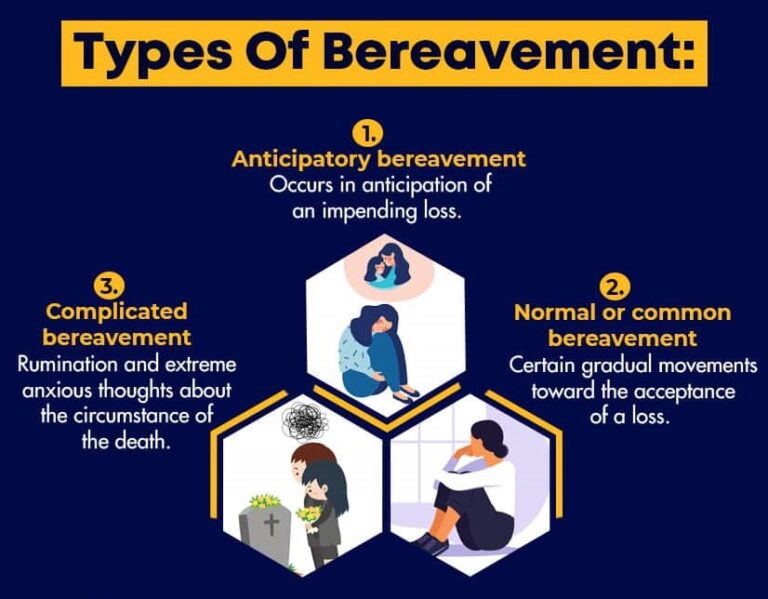
The intensity of bereavement or grief differs from person to person. Though grief follows a specific pattern, many people develop different symptoms that prevent them from performing their daily activities.
According to studies 16 PDQ Supportive and Palliative Care Editorial Board. Grief, Bereavement, and Coping With Loss (PDQ®): Health Professional Version. 2020 Dec 3. In: PDQ Cancer Information Summaries [Internet]. Bethesda (MD): National Cancer Institute (US); 2002-. Available from: https://www.ncbi.nlm.nih.gov/books/NBK66052/ , the following are the common types of bereavement:
1. Anticipatory grief
A 2016 study described anticipatory grief as a grief reaction that occurs in anticipation of an impending loss. The term is most often used when discussing the families of a deceased person.
2. Normal or common grief
Normal grief reactions can be characterized by certain gradual movements toward the acceptance of a loss, although the person can face difficulties in performing basic daily activities.
3. Complicated grief
It is a recently recognized condition that can lead to a person ruminating about the circumstances of the death. People with this condition experience chronic anxious thoughts about the consequences. Research suggests that about 7% of bereaved people experience complicated grief.
Causes Of Bereavement
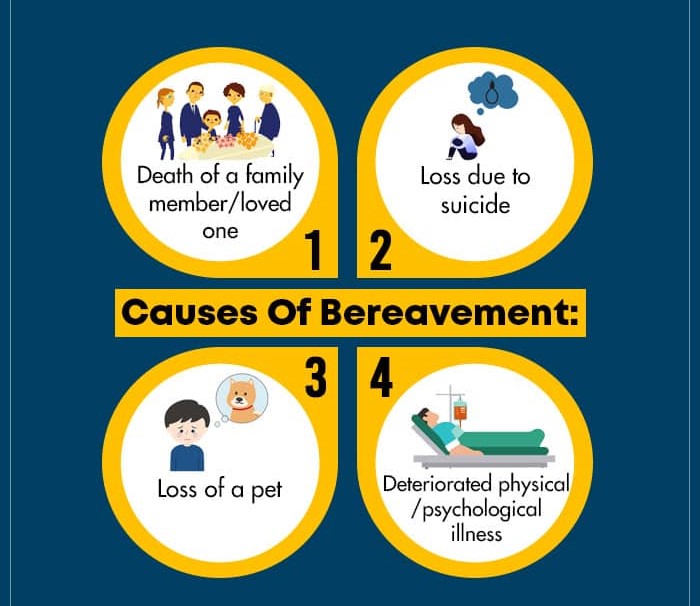
The circumstances during the loss and the relationship with the deceased inidvidual can play pivotal roles in how the bereaved person will respond to the loss. The following are some of the most common causes of bereavement:
1. Death of a family member/loved one
The loss of a loved one can be the most difficult experience one can have in their lifetime. A 2015 study 17 Keyes, K. M., Pratt, C., Galea, S., McLaughlin, K. A., Koenen, K. C., & Shear, M. K. (2014). The burden of loss: unexpected death of a loved one and psychiatric disorders across the life course in a national study. The American journal of psychiatry, 171(8), 864–871. https://doi.org/10.1176/appi.ajp.2014.13081132 mentioned that the bereaved person may have to deal with a multitude of decisions related to the loss, such as making funeral arrangements, finances, and more. The surviving one may experience extreme loneliness, even with the support of family and friends.
2. Loss due to suicide
People are often left in shock and guilt when a loved one dies by suicide. Study 18 Pompili, M., Shrivastava, A., Serafini, G., Innamorati, M., Milelli, M., Erbuto, D., Ricci, F., Lamis, D. A., Scocco, P., Amore, M., Lester, D., & Girardi, P. (2013). Bereavement after the suicide of a significant other. Indian journal of psychiatry, 55(3), 256–263. https://doi.org/10.4103/0019-5545.117145 found that coping with intense grief after a suicide can be more challenging than overcoming other losses. In many cultures, there are certain stigmas associated with a death by suicide that can increase the bereaved person’s vulnerability.
3. Loss of a pet
The death of a beloved pet is another significant loss 19 Uccheddu, S., De Cataldo, L., Albertini, M., Coren, S., Da Graça Pereira, G., Haverbeke, A., Mills, D. S., Pierantoni, L., Riemer, S., Ronconi, L., Testoni, I., & Pirrone, F. (2019). Pet Humanisation and Related Grief: Development and Validation of a Structured Questionnaire Instrument to Evaluate Grief in People Who Have Lost a Companion Dog. Animals : an open access journal from MDPI, 9(11), 933. https://doi.org/10.3390/ani9110933 and can trigger a period of intense sadness. A pet provides companionship and immense emotional support to a person. Losing a constant companion can lead a person to feel extremely overwhelmed by the intensity of grief.
4. Deteriorated physical/psychological illness
A sudden change in one’s physical and mental health condition or the ongoing chronic illness can also cause an intense feeling of sorrow. The patient may experience anger issues, anxiety, sadness, regret, and mourning as they struggle with the challenges regarding their health issues.
Stages Of Bereavement
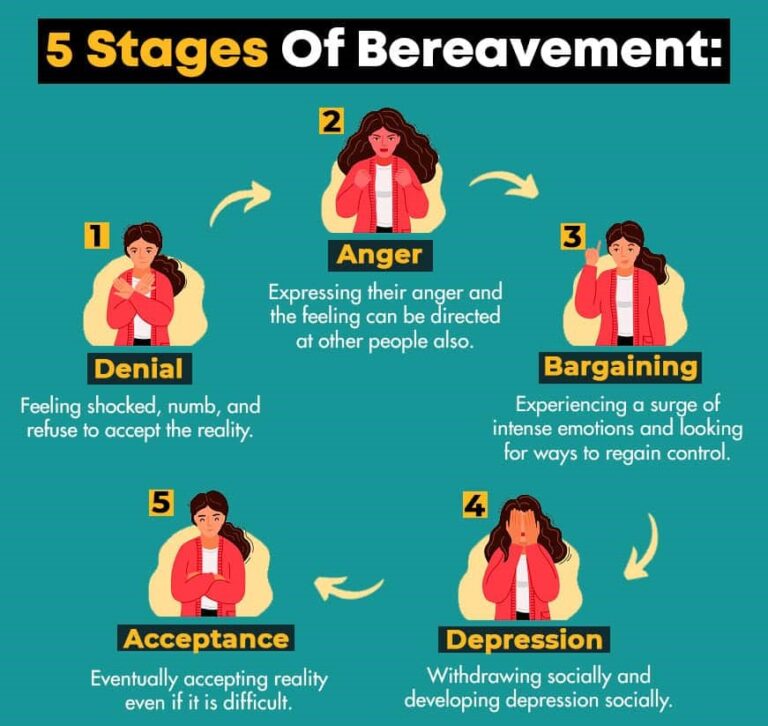
In 1969, Swiss-American psychiatrist Elizabeth Kübler-Ross mentioned that most bereaved people experience intense grief in a series of five different stages. Elizabeth’s theory of grief became known as the Kübler-Ross model 20 McAlearney, A. S., Hefner, J. L., Sieck, C. J., & Huerta, T. R. (2015). The journey through grief: insights from a qualitative study of electronic health record implementation. Health services research, 50(2), 462–488. https://doi.org/10.1111/1475-6773.12227 . The stages are as follows:
1. Denial
During this stage, a bereaved person may feel shocked, disbelief, and numb. He/she may refuse to accept the reality, but denying the situation gives one more time to gradually absorb the news.
2. Anger
After the realization of a loss, a person may express their anger and the feeling can be directed at other people also. Many bereaved express their anger even toward the individual who has died.
Read More About Anger Here
3. Bargaining
In this stage, most people become extremely vulnerable and helpless. They experience a surge of intense emotions and look for ways to regain control or change the outcome.
4. Depression
People are more likely to experience sadness and develop several symptoms of depression. They withdraw socially and may feel foggy, heavy, and confused.
5. Acceptance
In this stage of the process of intense grief, people become open towards the fact that their loved one is gone forever and eventually accept reality, even if it is difficult. But it is not necessarily a happy or uplifting stage of bereavement.
Diagnosis Of Bereavement
Bereavement is a natural response to a loss and not a psychological disorder recognized by the Diagnostic and Statistical Manual of Mental Disorders (DSM-5). But the DSM-5 21 Pies R. W. (2014). The Bereavement Exclusion and DSM-5: An Update and Commentary. Innovations in clinical neuroscience, 11(7-8), 19–22. mentions that complicated grief requires clinical attention as it can play the onset of other psychological conditions. There is no significant consensus among mental health professionals about how much time must pass before complicated bereavement can develop.
It can also be diagnosed by psychologists when the grieving becomes intense, persistent and debilitating even after 12 months. There are many similarities between the symptoms of clinical depression and complicated grief. Appropriate diagnosis is very important for effective treatment, that’s why comprehensive physical and psychological examinations are often advised.
Treatment Of Bereavement
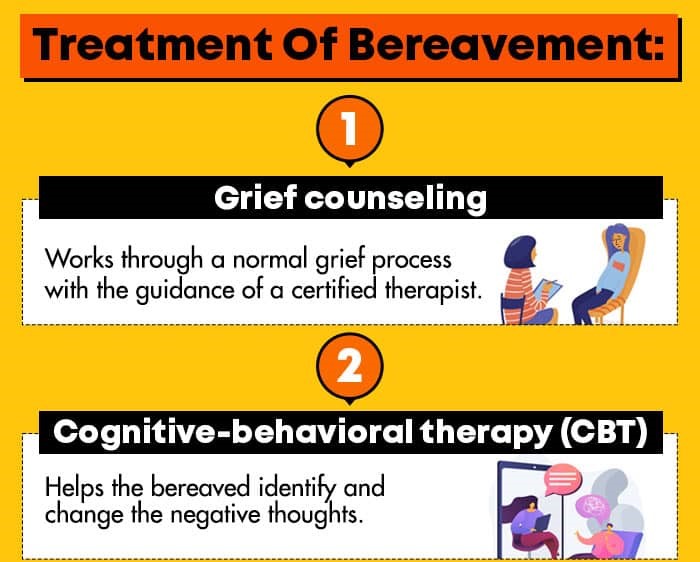
If someone is facing difficulties in coping with a loss and struggling with psychological distress, it is important to seek professional help. One can also explore difficult emotions and find social support by joining a self-help group.
According to a 2015 research paper 22 Simon N. M. (2013). Treating complicated grief. JAMA, 310(4), 416–423. https://doi.org/10.1001/jama.2013.8614 , psychologists often suggest a few beneficial treatments for prolonged bereavement, such as:
1. Grief counseling
It is also known as bereavement therapy. Grief counseling 23 Borins M. (1995). Grief counseling. Canadian family physician Medecin de famille canadien, 41, 1207–1211. is the most effective treatment as it works through a normal grief process with the guidance of a mental health specialist. It is mostly provided by professionally trained experts who help the mourners to accept the loss.
2. Cognitive-behavioral therapy (CBT)
CBT 24 de Groot, M., de Keijser, J., Neeleman, J., Kerkhof, A., Nolen, W., & Burger, H. (2007). Cognitive behaviour therapy to prevent complicated grief among relatives and spouses bereaved by suicide: cluster randomised controlled trial. BMJ (Clinical research ed.), 334(7601), 994. https://doi.org/10.1136/bmj.39161.457431.55 helps the bereaved identify and change the negative thoughts that affect their psychological health. CBT includes talking therapy that provides continuous support and helps people cope with their feelings.
Read More About Cognitive-behavioral therapy (CBT) Here
How To Cope With Bereavement
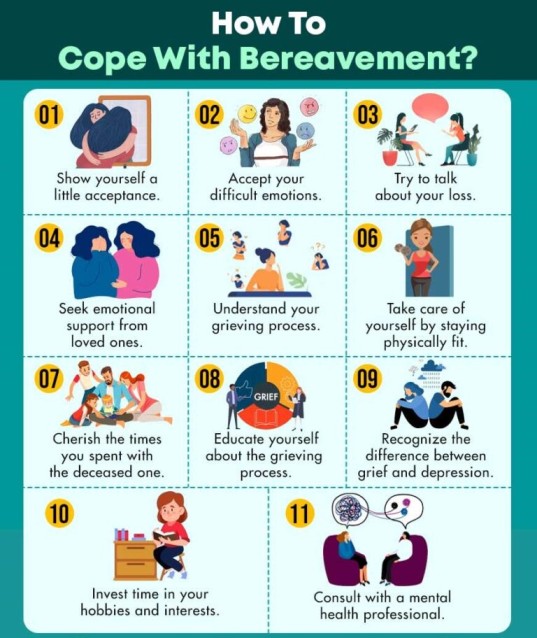
A person’s belief about death, life experiences, maturity level, religious upbringing, and cultural factors may also influence how that person will react during the grieving process. As it is a gradual process of responding to a loss, one cannot overcome it rapidly. But there are a few ways to help one deal with the pain and eventually move on in life, such as:
- Show yourself a little acceptance when you are experiencing difficult emotions.
- Accept that your grief and pain can trigger various unexpected emotions.
- Try to talk about your loss with your loved ones.
- Seek emotional support from your family and friends.
- Understand that your grieving process can be unique to you.
- Take care of yourself by getting enough sleep, eating healthy food, and staying physically active.
- Celebrate and cherish the good times you spent with the deceased one.
- Educate yourself about the grieving process and recognize the difference between grief and depression.
- Invest time in your hobbies and interests.
- Consult with a mental health professional, if you find extreme difficulty in dealing with the loss.
Read More About Major Depressive Disorder (Depression) Here
Coping With Bereavement
The bereavement process can be extremely difficult for some individuals with numerous ups and downs. It is likely to be more challenging in the beginning, but the most distressing period becomes less intense as time goes by. A person’s life experiences and the nature of the relationship he/she has with the deceased play major roles in how the person will respond to the loss. To seek the necessary support, one should consult with a mental health professional as only a psychiatrist or psychologist can help one come to terms with the loss and emotions.
Bereavement At A Glance
- Bereavement is a period of grief and associated emotions that people experience as they gradually adjust to the loss of someone important to them.
- It is a natural human emotion that comes with a range of physical and mental symptoms and cannot be referred to as a psychological disorder individually.
- There is a common belief that bereavement involves only sadness, but it can be more intense both emotionally and physically.
- Bereavement is a natural response to a loss and not a psychological disorder.
- The bereavement process can be extremely difficult for some individuals with numerous ups and downs.
